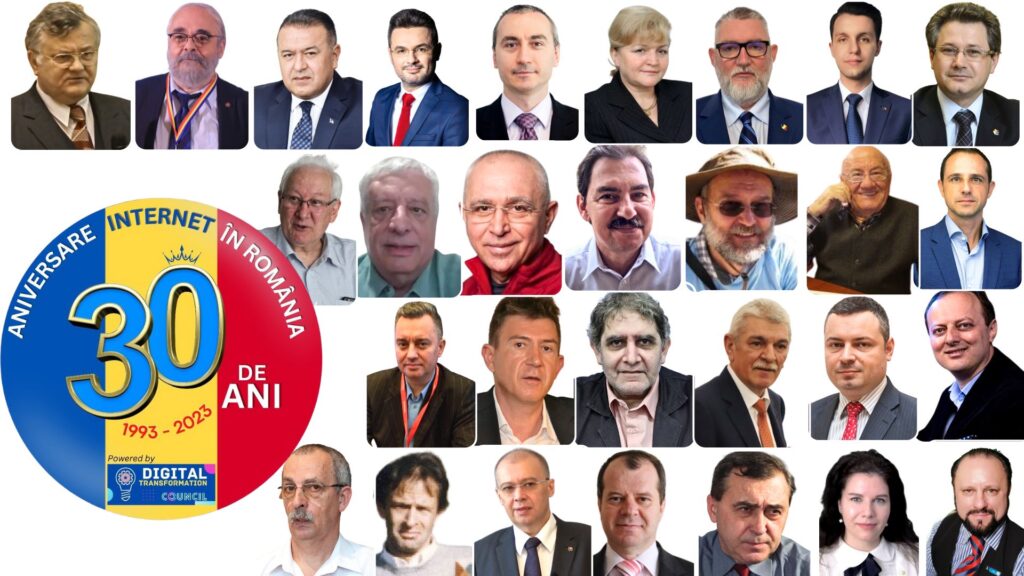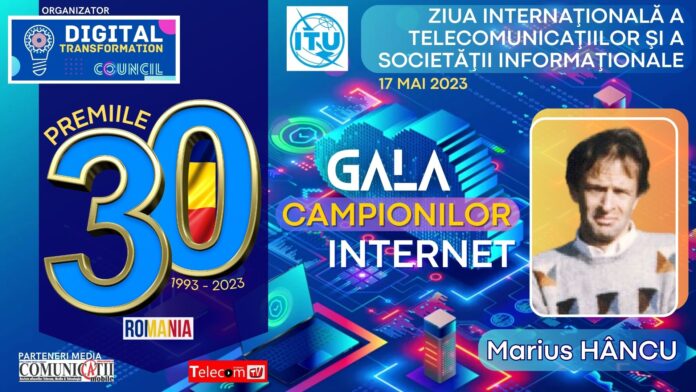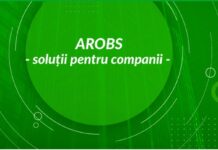Mesaj adresat de către Maris HÂNCU @ Gala Campionilor Internet – 30 de ani de Internet în România, organizată de Digital Transformation Council, în parteneriat cu Camera de Camera de Comerţ şi Industrie a României, alături de Revista COMUNICAȚII Mobile și TelecomTV, la Palatul CCIR, pe 17 mai, cu prilejul Zilei Internaționale a Telecomunicațiilor și a Societății Informaționale, moderată de Ion Vaciu și Roxana Onea.
FREE UNIX FOR ROMANIA – Working for the Programmer’s Freedom of Choice –
by Marius Hâncu
Let me first introduce myself.
At the time I started Free Unix for Romania, I was working as an Advisor/Conseiller in the Parallel Architectures Group at the Centre de Recherche Informatique de Montreal, in Montreal, Canada. I had been formerly on the faculty at the University Politehnica of Bucharest, Romania. I also worked at the University of Toronto, Bell-Northern Research Ottawa, and Hitachi Central Research Laboratory, Tokyo, Japan.
It is my pleasure to address ”Gala premiilor 30 ani de Internet in Romania” and to thank the organizers, especially Alexandru Rotaru, the Chairman of GURU, to whom I am grateful for presenting my article, for inviting me to contribute this address as the initiator and coordinator of Free Unix for Romania.

I will start with two mementos.
Memento I
We are standing on the shoulders of people who averred to be giants in one perspective or another. Also, and not to forget, this all has not come out of a vacuum, but of a deep felt need to affirm the true Romanian conscience. From those lost to time, I can only recall here the memories of five outstanding contributors: Professor Emeritus Irina Athanasiu from the Politehnica University of Bucharest, who fought as a lioness for each and every detail, Nini Popovici, who was really the backbone of the PUB communication center and of the Romanian academic network, Ted Lungu, from Caltech, who took over from me the leadership of Free Unix for Romania, Mircea Hâncu, my dear cousin, who managed the distribution in Timisoara, and Professor Emeritus Ioan Jurca from Politehnica University Timisoara, with many contributions there.
Memento II
I feel that The Soros Foundation for an Open Society made an important contribution to communications and networking in the Eastern Europe especially after 1994, as described in the following. Without trying to start any competition for priority here, I would mention my personal feeling that the force of the drive and the successes that Free Unix for Romania had scored in its first two years played an important role in changing the cap for the Soros Foundation itself.
The enthusiastic effort of Free Unix for Romania has been centered on sending public domain and/or freely distributable (as opposed to pirated) software to the Romanian universities, individual programmers and companies, accompanied by related computer science books.
It has been started by me using as vehicles the electronic media: electronic mail, the newsgroup soc.culture.romanian on the Internet, and the mailgroup romanians@sep.stanford.edu (based at Stanford University, also on the Internet). The volume of work was considerable (over 2,000 messages as of today). I would like to thank one-time organizers/administrators of these groups, Nick Sandru and Alexander Mihai Popovici, for their silent, but active, cooperation.
The main focus of Free Unix for Romania was on sending free varieties of the well-known operating system Unix, which is presently widely used in many universities, research facilities and other places, all over the world.
The systems sent were complete with advanced programming environments, editors, compilers for multiple programming languages. etc. These varieties are known as Linux and 386BSD and were available without fee or authorization from hundreds of computers all over the world. However, they were not available in Romania before we started this action, mainly as a result of poor telecommunications equipment.
Our decision to choose these systems was based on the fact that they were free and thus able to be distributed with no restrictions or copyright infringements all over Romania. They were also running on the 386/486 PCs, which were then and for the immediate future the most ubiquitous computing platforms in Romania, based on their cost.
– The 1993 Snapshot –
Let place ourselves back in 1993, after one year of frenetic activity, and consider the situation at that point in time.
Free Unix for Romania was initially born in the autumn of 1992, out of concern for some of our fellow Romanians which were confronted with employment problems in their process of immigrating to Canada and the United States. They were faced with programming environments and sets of tools, especially Unix and X windows, that were virtually unknown to the vast majority of them.
As a parenthesis, I would like to mention that, as far as I know, Unix was introduced in Romania in the mid-eighties, by the work of teams at ITC. However, its penetration seems to have been small. Also, some of the universities were teaching UNIX as an operating system, but because of poor resources the students did not really get to know the system. I would like to pay my respects to these forerunners in the introduction of Unix to Romania, for it is them who planted the initial seeds of interest.
In the process of trying to help my Romanian friends in Canada and United States, I became aware that two free varieties of Unix were under development by Bill Jolitz, formerly of the BSD project at the University of California, Berkeley, and Linus Torvalds, from the University of Helsinki. At that time, these systems are both perhaps two years old. The names of these free Unix derivations are 386BSD and Linux. Both are copyrighted by their authors, so strictly speaking they are not public domain software. But their copyrights are designed in a way that encourages the free and unlimited distribution, once the copyright (or „copyleft”) notice is kept together with the program code.
Being free software, these systems borrowed heavily from the experience and products of the GNU project, founded by Richard M. Stallman, arguably the most famous programmer of the time, at MIT. All the source code of the GNU tools had been available for several years, thus what Bill Jolitz and Linus Torvalds, two other outstanding programmers (Linus was then only 23 years old and a student) did was to redesign from the ground up the kernel.
As of this writing, myself and Adi Rotaru are working around the clock to ensure the participation by Mr. Stallman at your conference, via satellite. We just hope our efforts will prove fruitful.
Also as of this writing, I hope a presentation of Linux will be made at this conference by Professor Irina Athanasiu, whohas made a major contribution in its proliferation in Romania and to Free Unix for Romania in general. Irina, you have our heartfelt thanks for all you did!
After using my friends in Canada and United States as beta testers, I decided that the systems were stable and powerful enough to be used successfully in Romania for the introduction of Unix at the grassroots level, with no cost involved in terms of software. Consequently, I started a massive campaign of advertising for help on the Romanian electronic groups mentioned above. This campaign was in 1993 still in full drive.
In response to my appeals, volunteers from all over the world contributed by:
– obtaining public domain software, recording and shipping it to Romania (over 5,000 Mbytes)
– donating diskettes, magnetic tapes, CD ROMs, terminals and other equipment – making financial contributions wich have been used mainly for sending related computer science books to te universities of Romania
– distributing, installing and testing the software in Romania
– registering their names for Know-how for/from Romania, a wide-ranging data-base of specialists willing to be contacted by their colleagues in Romania for consultation on technical matters, bibliographical matters, etc., also started by me.
Many of the initial donors, which have ftp-ed and shipped Linux and 386BSD to Romania, come to my mind when I think back at our starting moments: Romulus Vlasie and Viorel Negru, who took the first copy of SLS Linux to Romania (both from the University of Timisoara), Ted Lungu (from NASA), who sent several copies of the SLS Linux, Edward Nicolescu (from Cornell University), who did the same, Prof. Mihai Datcu (on leave from the Department of Electronics of the Politehnica University Bucharest) and Ivonne Nicolescu (from the Freie Universitaet Berlin) who shipped 386BSD, Dan Grecu (from the Worcester Polytechnic Institute).
In Romania, an important contribution was made by the PC Report magazine, by publishing an article by Professor Irina Athanasiu, concerning the availability of free software sent by us, together with a list of distribution centers. The article on Linux by Eugen Rotariu was also quite instrumental in making the Romanian programming community aware of the features of Linux. Two companies, System Plus International (of Bucharest) and Berg Computers (of Timisoara) started to distribute freely Linux together with some of their systems. System Plus International also exhibited a Linux-based system at CERF’93, increasing the awareness. We would like to hope that other companies will support the distribution of free software in Romania. This can only increase the level of programming expertise, as many programmers prefer to work on their own systems, at home. From the very beginning, our belief was that free software must coexist with proprietary software in Romania. The growth of the software and systems market passess through the education of the users, at least in my view of things.
Free Unix for Romania has also received coverage in the prestigious Communications of the Association for Computing Machinery, in the July 1993 issue, which included an appeal for help by Professor Irina Athanasiu on behalf of Romanian computer scientists.
Presently, I was saying then, in 1993, as a result of these efforts, Linux and 386bsd are installed at over 90 locations in Romania, including universities, research institutes, private companies, individual computer scientists and students. And there is a tremendous request for related documentation and computer science books (especially describing the structure and operation of the Unix system).
As a result of the donations (presently at the 3,000$ mark), we have been able to send a relatively comprehensive set of Unix books to the Politehnica University Bucharest (curator: Prof. Mircea Bodea) and to the Universities in Timisoara (curator: Mircea Hâncu, my cousin).
At this point in time, I would like to express my deepest thanks to all who made financial contributions, from 20 to 200$, all very important. The list is too long, but I would like to sample several names: George Costache (University of Ottawa, Ludwig Galambos (Stanford University), Sorin and Octavia Cismas (LSI Logic), George & Cornelia Haber, Galina and Mihai Popovici, Alexandru Mitaru (Tektronix), Constantin Sevici, Mihai Dima (University of Colorado), Virgil and Elena Simplaceanu (of Carnegie-Mellon University).
In principle, at that time, we had fulfilled our first target of making free, Unix-like, operating systems and full programming environments available to Romanian computer scientists, programmers and applications specialists. The next step was the coverage of the various application software domains. In this area, we have been quite successful too.
Our intention was/is to create centers of excellence in the use, porting and distribution of free software. At the present time, we have in place several such centers oriented on specialties.
The center in the Department of Electronics of the Politehnica University Bucharest (Prof. M. Bodea), has installed many packages in VLSI design. Main contributors in this area were Viorica Simion from the Delft Institute of Technology, Radu Cotet from Namur University, Traian Mitrache from University of Southern California, Edward Nicolescu from Cornell University and myself. Some of the major packages that were installed are: magic, Caltech VLSI tools, Alliance VLSI design system, Ocean/Nelsis VLSI design system, the switch-level simulator ESIM, Isplice (high level simulator). Several of these tools are already used in teaching and research.
At Timisoara, prof. Ioan Jivet was starting a similar center in free software for VLSI and hardware design (in the Department of Electronics). Prof. Petru Eles and Marius Minea have made ftp contributions to it, while being abroad at the Linkoping University.
In terms of software engineering and parallel and distributed computing, a major center of free software testing and distribution has been implemented in the Department of Computer Science of the Politehnica University of Timisoara (led by future Professor emeritus Ioan Jurca, passed away in 2014). Some of the parallel packages already functional on a network of workstations are: pvm/hence, mentat, paragraph. Many others are in testing. They are all state-of-the-art packages, barely appearing on the network. As major contributors I would like to mention again Edward Nicolescu from Cornell University, Ovidiu Sandor, Prof. Petru Eles, Marius Minea andmyself. With Timisoara we have the privilege of an active direct uucp connection provided by the Tempus project, which enabled us to send massive amounts of software in email/uuencoded form. I would like toappreciate especially the degree of involvement of both Professor Jurca and Cristian Ionitoiu, the system administrator of the local node, inthe day-to-day operations, on many weekends too. This is what we expect, plainly speaking, as we do it ourselves.
The Department of Computer Science of the Technical University of Timisoara had just benefited then from a major donation (12,000 DM) from Novell-Germany, arranged by our contributor Sanda Graetz, from the University of Duesseldorf. Being proprietary software, it could not be distributed, unfortunately, nonetheless I would like to underline it as being something very positive. We just hope more companies present or not at this conference will make such gestures.
Further, Ion-Alexandru Neag and Stefan Gal, both on faculty staff in the Department of Electronics of the Technical University of Timisoara had made important contributions, by ftp-ing, while at the University of Dortmund, vast amounts of free software and references for the neural networks and fuzzy logic areas. Starting September, this software will be available at their respective locations for all interested parties in Romania, at no cost, as it proceeds at all centers.
From the outset, we had a very good cooperation with GURU and its president, Alexandru Rotaru. GURU was another major distribution center for Linux and bsd related packages. A major help was provided in this respect by Daniel Dumitriu. I would like to address personal thanks to Adi Rotaru for his degree of personal involvement, for the many messages through which he kept us informed about the local developments and needs. Thanks, Adi, and keep going!
In Cluj-Napoca, things had progressed, honestly speaking, a little bit slower, especially because of poor network connections. However, thanks to volunteer efforts spearheaded by Dan Grecu (of the Worcester Polytechnic Institute) and Daniel Marcu (of the University of Toronto), Linux was present as are many other free programs in CD ROM format, at Professors Letia Ioan and Kalman Pusztai, in the Department of Computers at the Technical University. We really hope that people in Cluj will try to benefit/copy more of the packages sent to other centers, until the networking conditions improve.
At the present time, KNOW-HOW FOR/FROM ROMANIA is administered by Tiberiu Grigoriu, of Concordia University in Montreal. We were happy to report over 100 names on this list. As a special notice, the list had become bidirectional, including specialists not only from abroad, but also from Romania and Moldova. Thus, we were hoping to bridge a true exchange of information in various areas, from history and mathematics to computer-aided design, between the specialists in Romania and those temporarily or permanently abroad.
In 1993, I had started the first international Romanian electronic courier, NEUROM, in the field of artificial intelligence, neural networks, fuzzy logic and connected domains. In this way, we were trying to keep the specialists in Romania informed on the latest news in this area. We hoped to establish, with the help of specialists listed on the Know-how list, several more such couriers / electronic lists in other areas.
This, we concluded, will be the focus of our effort in the future, the expertise exchange and fostering the co-operation in the Romanian international community, as gradually more centers in Romania would have ftp facilities which would enable them to get the software themselves over the network.
During all this time of feverish activity, a very important contribution to ensuring the flow of information was made by Nini Popovici, Eugen Staicut, , Cristian Ionitoiu and other system and network administrators which on many occasions had to contend with a large flow coming from me and other participants to this drive. Ivonne Nicolescu from Freie Universitaet Berlin constantly helped us with her practical expertise in the area of networking. Thanks, we are counting on you from now on too!
I cannot end this part without providing the addresses of some of the free distribution centers at this time.
Prof. Mircea Bodea, Prodecan, Facultatea de Electronica si Telecomunicatii University „Politehnica” Bucharest – is the custodian major Unix book collection sent by us
Prof. Irina Athanasiu Facultatea de Calculatoare University „Politehnica” Bucharest
GURU Romanian UNIX USER GROUP 21, Bucharest, Rotaru Alexandru and Togui Radu
Ing. Mircea Hâncu Timisoara, (my cousin) – the curator of books and Linux for Timisoara
Prof. Ioan Jurca Professor Emeritus Prorector, Politehnica University, Timisoara
ANDREI Paul & Andrei AXON International SRL IASI
Prof. Letia Ioan Alfred Catedra de Calculatoare Facultatea de Automatizari-Calculatoare Universitatea Tehnica Cluj-Napoca
Preparator ing. Costin Badica (in 2023 a professor at Craiova). Asist. ing. Mihai Mocanu (now a professor) Fac. Automatica, Catedra Calculatoare Craiova
– The 1994 Snapshot –
Let us consider the situation again in 1994, after two years of activity.
During its first two years, Free Unix for Romania was coordinated by me. After September 21, 1994, it was being coordinated by Teodor (Ted) Lungu of Caltech.
The initial purpose of Free Unix for Romania was shipping free software to Romanian universities, to individuals and companies, as well as books used in some of the best known universities of the world. However, at this point in time, it has reached areas and achievements considerably wider than those planned initially.
The systems shipped are complete with programming environments, editors, compilers for various programming languages, etc. These systems are freely available for anonymous ftp on various computers all over the world. However, they were not available previously in Romania, before the start of our drive, mainly as a result of poor telecommunications equipment.
At the time of this writing, myself, Alexandru Rotaru and Irina Athanasiu are working to ensure the participation of Richard Stallman and of Linus Torvalds at the ROSE’94 conference in the free software section. We just hope our efforts will prove fruitful. This would be a great event for the Romanian software community.
The main base used for the activities of Free Unix for Romania was the Internet, via email and the Usenet newsgroups. A special note deserves the email list romanians@sep.stanford.edu (installed and administered by Alexander Mihai Popovici) as well as the newsgroup soc.culture.romanian (with Nick Sandru of Denmark having a decisive contribution to the its creation and archiving).
Multiple activities and groups entered gradually under the umbrella of Free Unix for Romania. We would like to mention ‘Know-how for/from Romania’ (administered by Tiberiu Grigoriu, BNR, Ottawa, Canada), a list which includes specialists from Romania and Moldova which want to cooperate internationally, as well as specialists from the whole world, willing to help their colleagues from Romania. Another list is the email list for Romania (administered by myself, helped by others), covering all the academic and commercial networks which provide us with relevant data. We have created also several specialized lists: NEUROM (administered by Daniel Marcu, of University of Toronto and Gabriel Climescu of University of Neuchatel, Switzerland); FIZICA (administered by George Dobre, of Kent University, England); Rom-Unix (administered by Jean-Henry Berevoescu, Israel), which provides assistance in the Unix domain.
Recently, Florin Radulescu has installed the first Romanian gopher at PUB, while Gabriel Climescu installed another gopher in Switzerland, at theUniversity of Neuchatel, which exchanges information with the one in Bucharest. These gophers contain information on Romania (on tourism, economy, etc). These servers can be accessed from anywhere in the world. Recently, Octavian Ureche from the Universite de Montreal has installed the first home page for Romania on the World Wide Web. Others have contributed information related to Romania for the World Wide Web.
Gradually, we started to contribute to the establishment and the consolidation of the national computer networks in Romania (especially of the academic ones), via software, on-line help and advice, and remote testing.
It was not easy, but we have been helped by many generous people, who: – obtained free software, recorded it, transported it (many Gbytes have been sent in Romania) – donated diskettes, magnetic tapes, CD-ROMs, terminals, printers and other equipment – contributed financially (their contributions have been utilised maily for shipping computer books to the universities of Romania) – distributed, installed, and tested free software in Romania – registered their name on the Know-how for/from Romania list.
It would be difficult to give a complete list of all contributors (only the donation list contains more than 200 persons), but we are deeply grateful to all of them.
As one of the main successes, we would like to mention that Linux, onen of the Unix-like operating systems which we have continuously shipped, is presently installed in over 125 places in Romania and Moldova.
Concerning the support base of Free Unix for Romania, we would like to emphasize that it was defined from the very beginning as a grassroots type of organization, relying on the enthusiasm of computer hobbyists and professionals. At this level, the success has been remarkable, as we managed in less than a year to practically cover the entire surface of Romania with free software distribution centers, of course of various sizes.
Our appeal to private or government organizations, both in the West as well as in Romania, has not had the same success. We have sent information on our activities to the Romanian embassies in Washington and Paris, for example, without receiving any reply. We were received with understanding at the American and Canadian Embassies in Bucharest, but we have not had any concrete results in terms of donations (obtaining, however, a list of organizations which could be contacted in this respect). Several persons have contacted variousWestern foundations, using our presentations, in order to obtain support: we have not yet obtained any concrete results.
In these circumstances, we have been extremely pleased and surprised with the approval of our application made to the Soros Foundation for an Open Society in Romania. A substantial grant of 10,000 US$ (the maximum allowed) was awarded to us in order to buy and ship Unix books to more than a dozen universities in the whole country. The shipment was coordinated personally by myself and was done by many enthusiastic volunteers of Romanian origin in Canada and the United States (PhD students or professionals). By the effort of the Soros Foundation and of GURU (the Romanian Group for Unix Users, chaired by Alexandru Rotaru) the free software which we are constantly sending has been distributed to over 25 high schools in Romania. Technical education camps were provided by the Soros Foundation and the GURU organization, where the high school students and their teachers were familiarized with free software products.
We must underline here the exceptional efforts done by our collaborators in Romania, such as Prof. Irina Athanasiu, Prof. Mircea Bodea, Alexandru Rotaru, Prof. Viorel Negru, Prof. Ioan Jurca, Prof. Cristian Ionitoiu, Prof. Petru Eles, Daniel Dumitriu, Claudius Dan, Sorin Spanoche, Dragos and Mihai Manolescu, Andrei Pitis (AD 2023: a major factor and founder in capital investment in the Romanian software industry and the president of ANIS, the National Association of the Software and Services Industry), Tudor Hulubei (today, a senior software engineer with Google), Mihai Pop (AD 2023, a Professor and the Director of the University of Maryland Institute for Advanced Computer Studies), Matei Conovici, , Eugen Rotariu and many more who have contributed to the spreading of our actions. Without their contribution, nothing could have been possible How great the quality of the contributors to our drive was is clearly pointed out by e.g. the current positions that Andrei Pitis, Tudor Hulubei and Mihai Pop (all three having developed under the care of Prof. Irina Athanasiu), or that Claudius Dan (developed by Prof. Mircea Bodea) is a full professor at Politehnica University Bucharest.
Concerning the Romanian government organizations, we have not yet been able to start a real dialogue. It seems that their reaction speed does not match the rhythm of our drive. However, even if we have not had direct contacts with the CNI (the National Council on Informatics), we are in direct dialogue with many specialists from ICI (the Central Institute on Informatics), especially with Eugen Staicut, which, just like Nicolae (Nini) Popovici of the Politehnica University Bucharest, has had a capital contribution in the creation of the Romanian academic networks (ROERN and PUB). However, no official contacts have been established.
Another example in the same line: the Ministry of Technology made an appeal last year for assistance, addressed to the Romanian specialists living abroad. At that point in time, the Know-how list was defined to a large extent. We informed the Ministry that the list existed, however we did not have any reply.
However, in terms of institutional contacts, we have recorded some success in our contacts with CEPES (Centre Européen Pour l’Enseignement Superieur) of Bucharest, with which we exchange information.
For the time being, our strategy is based on personal contacts and the work of individuals. Should our results in contact with government organizations improve, we will change our strategy.
Our choice for Linux as an operating system and programming environment has proven to be very inspired and fortunate. Presently, many communication servers in such large university centers as Cluj, Iasi, Sibiu, as well as on the large LAN of PUB are Linux-based, with very good performance. This avoided tremendous costs for the universities involved. Tens of university students and professors have also adopted Linux as their programming environment of choice on their PCs at home or work. The great effort of GURU (sponsored by the Soros Foundation) to make free software in general and Linux in particular popular in the Romanian high-schools seems to be a success, especially with students, which are of course our main target audience. The next step is to see many more programmers from Romania getting involved not only as consumers but also as authors, in the projects such as those carried by Free Software Foundation and the Linux project. We have tried to help GURU in this effort by providing at all times recent versions of such free software and have to underline the considerable help we have received in this respect from the international free software community (via shipments of Linux and GNU CD-ROMs, books, etc).
As a result of these efforts, many university centers in Romania are really ‘1994 – up to date’ in terms of the date of their Unix and Linux systems. However, problems still exist concerning the awareness of all potential users with respect to the large pool of free software already available in Romania, and of the sites and people involved, which can and do provide free assistance. Sometimes, old attitudes related to secrecy creep showing up … We at Free Unix for Romania have permanently and vigorously fought against such manifestations and will continue to do so.
We have to appreciate the interest the Romanian media have shown to our work. Initially, this was localized at the PC Report magazine in Targu Mures, which published several articles on our organization and free software (especially Linux). Lately however, several Romanian newspapers have email access and have described part of our activities. We would like to emphasize especially the work of Eugen Rotariu and U. Valureanu. In order to help the users in Romania follow up more closely the developments in the Linux world, we have also made subscriptions for several professors to the Linux Journal.
In concluding, we have shown through Free Unix for Romania, that a coherent, decisive and efficient action is possible in the Romanian international community, if the necessary effort is used. At that point in time, for the Romanians on the Internet, without false modesty, Free Unix for Romania had become a model to follow.
We hope that the technical progress in Romania will continue, and that it will accelerate. The introduction of academic and commercial networks in Romania also contributed to reducing the difference in terms of thes introduction and knowledge of Unix, which was considerable two years ago. Presently, several institutions in Romania can ftp directly, from the Internet, programs without our assistance (unfortunately, this isvalid only for medium sized programs).
As of the autumn of 1994, we very much hope that the Romanian telecommunication networks will make progress. Presently, for example, Poland is using bit rates of 64Kbits/s or even 2Mbits/s, while the Romanian networks operate at 9.8Kbits/s. In our opinion, the quality of telecommunications will be the number one factor in the progress of theRomanian computer and telecommunication industry in the next decade. In this respect, we hope that more Romanian universities will follow the example of the Politehnica University of Bucharest, by connecting themselves to the Internet. And we also hope that the Romanian government and other national and international organizations will help the PUB to remain connected to the Internet.
Now, after enough time to draw reasonable conclusions, in 2023, we can firmly state that the Free Unix for Romania movement managed to accumulate and radiate great amounts of goodwill and energy, to associate people of great talents who for a moment forgot their personal interest in the interest of a modern Romania.
And I will be closing on a personal note: significantly, the access to Internet in Romania is presently considerably faster than in the USA or Canada. That is enough of an Q.E.D. to me and many others.








